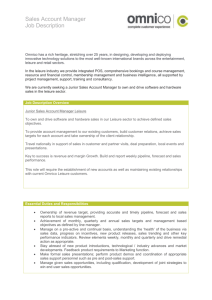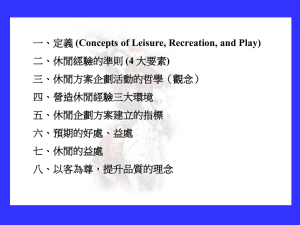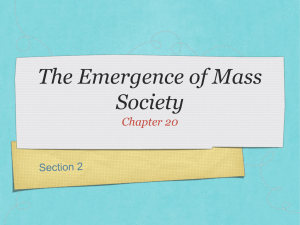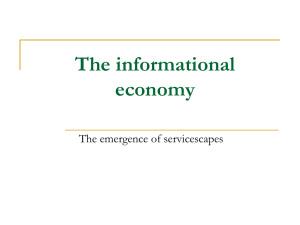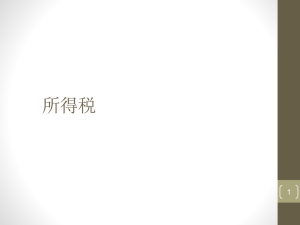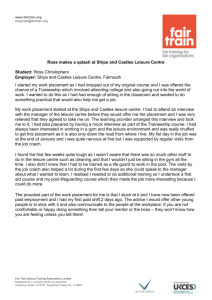1995 210 Syllabus - North Carolina State University
advertisement
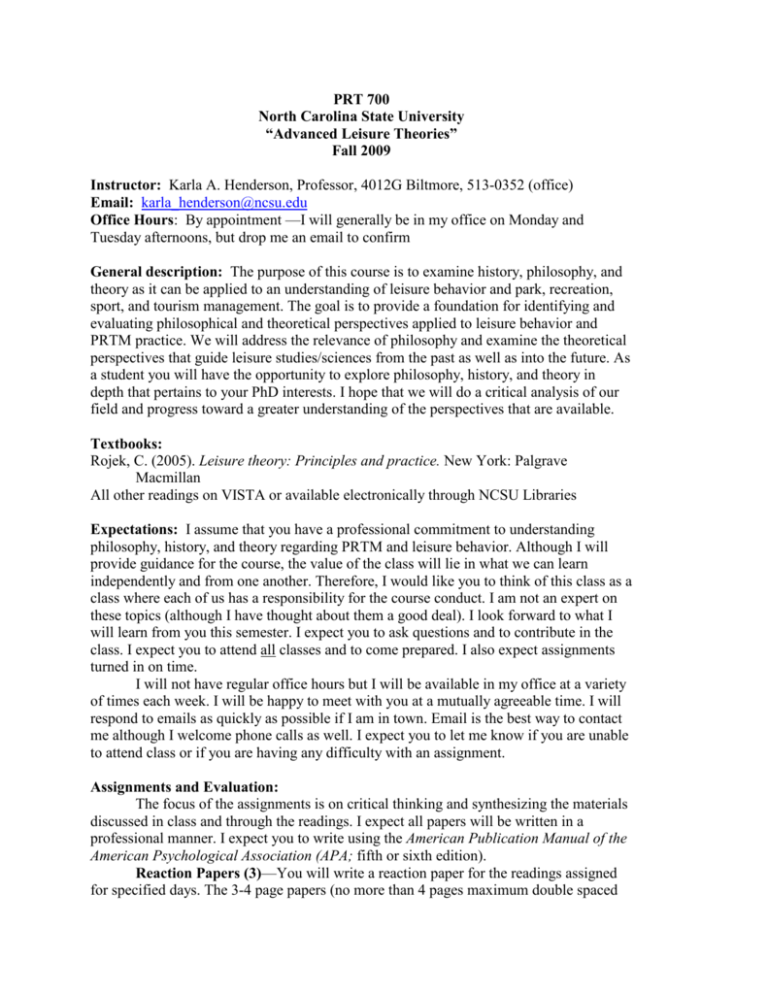
PRT 700 North Carolina State University “Advanced Leisure Theories” Fall 2009 Instructor: Karla A. Henderson, Professor, 4012G Biltmore, 513-0352 (office) Email: karla_henderson@ncsu.edu Office Hours: By appointment —I will generally be in my office on Monday and Tuesday afternoons, but drop me an email to confirm General description: The purpose of this course is to examine history, philosophy, and theory as it can be applied to an understanding of leisure behavior and park, recreation, sport, and tourism management. The goal is to provide a foundation for identifying and evaluating philosophical and theoretical perspectives applied to leisure behavior and PRTM practice. We will address the relevance of philosophy and examine the theoretical perspectives that guide leisure studies/sciences from the past as well as into the future. As a student you will have the opportunity to explore philosophy, history, and theory in depth that pertains to your PhD interests. I hope that we will do a critical analysis of our field and progress toward a greater understanding of the perspectives that are available. Textbooks: Rojek, C. (2005). Leisure theory: Principles and practice. New York: Palgrave Macmillan All other readings on VISTA or available electronically through NCSU Libraries Expectations: I assume that you have a professional commitment to understanding philosophy, history, and theory regarding PRTM and leisure behavior. Although I will provide guidance for the course, the value of the class will lie in what we can learn independently and from one another. Therefore, I would like you to think of this class as a class where each of us has a responsibility for the course conduct. I am not an expert on these topics (although I have thought about them a good deal). I look forward to what I will learn from you this semester. I expect you to ask questions and to contribute in the class. I expect you to attend all classes and to come prepared. I also expect assignments turned in on time. I will not have regular office hours but I will be available in my office at a variety of times each week. I will be happy to meet with you at a mutually agreeable time. I will respond to emails as quickly as possible if I am in town. Email is the best way to contact me although I welcome phone calls as well. I expect you to let me know if you are unable to attend class or if you are having any difficulty with an assignment. Assignments and Evaluation: The focus of the assignments is on critical thinking and synthesizing the materials discussed in class and through the readings. I expect all papers will be written in a professional manner. I expect you to write using the American Publication Manual of the American Psychological Association (APA; fifth or sixth edition). Reaction Papers (3)—You will write a reaction paper for the readings assigned for specified days. The 3-4 page papers (no more than 4 pages maximum double spaced NCSU 2 in 11-12 point font) should include a brief (3-4 sentences) summary of the readings (I will also have read the readings so you do not need to elaborate in the description!), an identification of the strengths, weaknesses, and relationship of the arguments presented, a description of how these readings relate to other readings undertaken (in this class or elsewhere), and a discussion of additional questions that came to your mind as a result of reading this literature. Note: Even when it is not your assignment to WRITE a reaction paper, I expect you to come to class having analyzed the readings in this same manner. History Presentation—Each of you will choose a different aspect of the PRTM profession (e.g., sport management, youth sports, tourism, federal land management, NC State Parks, NC State PRTM, etc.) and provide a 15-20 minute presentation to the class about the background of this particular field of study. You will also write a short paper (4-5 pages) that summarizes the history and philosophy of the particular area chosen. Classic PRTM Text—Each of you will read a classic text from the field of leisure behavior, parks, recreation, sport, or tourism. This book needs to be approved by me. You will write a 3-4 page book review describing the contributions the book has made to understanding PRTM. Address how this book is relevant, or irrelevant, today. You will also make a 10-15 minute presentation in class summarizes the book for your classmates. Theory Proposal--You will choose a theory or theories relevant to your interests and ongoing work in leisure, park, recreation, sport, or tourism research. You will read broadly and deeply in our literature as well as related fields to uncover as much as you can about the strengths and weaknesses of the theory. You will then make a formal presentation (15-20 minutes) to the class about the theory and be prepared to discuss and (if necessary) defend its potential applied to your interests. “This I Believe” Professional Philosophy—You will write a 3-4 page statement regarding your philosophy of life, leisure, teaching, and scholarship. This personal philosophy will reflect your beliefs but should be grounded in the works of others who may share a similar philosophy. The discussions in this class will contribute to this paper as well as your independent scholarship regarding the broad field of PRTM. In addition to the paper, you will lead an informal discussion with the class regarding your philosophy. Academic Integrity and Reasonable Accommodation: Academic Integrity: Academic integrity is expected of every student. The academic integrity policy can be found at: http://www.ncsu.edu/student_affairs/osc/AIpage/acaintegrity.html Reasonable Accommodation: If you have a disability that may require assistance or accommodation or if you have any questions related to any accommodations for testing, note takers, readers, etc, please speak with me within the first week of the course. Students may also contact the disability Services for Students office at 1900 Student Health Center, Campus Box 7509, Raleigh, NC 27695-7509 Voice: (919) 515-7653 or TTD: (919) 515-8830 or http://www.ncsu.edu/provost/offices/affirm_action/dss/about/index.html with questions about such services. NCSU 3 Course Purpose, Objectives, Assignments, and Schedule Overall Purpose: To explore the historical and contemporary philosophical and theoretical perspectives related to leisure and PRTM that have (and are) guided(ing) the development of the body of knowledge. To develop critical thinking within and about the field of leisure studies and PRTM. To apply theoretical perspectives and theoretical frameworks to areas of research interest. August 25 Get-Acquainted, Exploring the Construction of Knowledge Objectives: To examine the relationship between theory and “ways of knowing.” To become acquainted with one another and the backgrounds and goals each of us brings to this examination of theory Henderson, K.A., Presley, J., & Bialeschki, M.D. (2004). Theory and leisure research: Reflections from the editors. Leisure Sciences, 26(4) 411-426. (electronic) Unit 1 –History and Philosophy Objectives: To explore the historical and philosophical roots of leisure and the PRTM profession To examine what philosophy has to contribute to PRTM September 1 Why Philosophy, History, and Theory are Important? Overview Cooper 1 (Some Philosophical Aspects) Dustin and Goodale 29 (Reflections on Recreation…) Rojek Text: Introduction Goodale and Godbey (Hard-to-Define Values…) Searle, M.S. (2000). Is leisure theory needed for leisure studies? Journal of Leisure Research, 32, 138-142. (electronic) Parr, M.G. (2000). Knowing something about leisure: Help or hindrance? Journal of Leisure Research, 32, 101-105. (electronic) Rojek, C. (1997). Leisure theory: Retrospect and prospect. Loisir & Societe (Society and Leisure), 20(2), xx. September 8 Philosophical Foundations of Leisure Rojek Text: Chapter 9 Sylvester 2 (Western Idea of Work) Coalter 31 (LS and LSt: The Challenge of Meaning) Henderson (Expanding the meanings of leisure in a both/and world) Freysinger, V., & Kelly, J. 3 (The Classics) Freysinger, V., & Kelly, J 4 (Work and the Industrial City) Assignment: Reaction Paper (A-P) NCSU 4 September 15 History of the Profession Assignment: Student Presentations and Paper September 22 Contemporary Philosophical Issues Rojek Text: Chapters 1 and 2 and 6 Rose, J., & Dustin, D. (2009). The neoliberal assault on the public university: The case of recreation, park, and leisure research. Leisure Sciences, 31, 397-402. (electronic) William, DJ. (2009). Deviant leisure: Rethinking “the good, the bad, and the ugly.” Leisure Sciences, 31, 207-213. (electronic) Iwasaki, Y., Nishino, H., Onda, T., & Bowling, C. (2007). Leisure research in a global world: Time to reverse the Western domination in leisure research? Leisure Sciences, 29, 113-117. (electronic) Assignment: Reaction Paper (R-Z) September 29 Classic Texts Assignment: Student Presentations and Paper Unit 2- Traditional Theoretical Perspectives and Leisure Objectives: To determine why theory is of value in both macro and micro ways To develop a common framework for discussing the terms related to theory (theoretical perspectives, theoretical frameworks, formal theory, substantive (grounded theory) To examine the theory that is explicit in positivism and interpretive research To identify the disciplinary bases and perspectives of theory used in leisure studies by examining sociology, economics, psychology, and social psychology perspectives October 6 Theory and Methods Samdahl 8 (Epistemological and Methodological issues) Stebbins, R.A. (1997). Exploratory research as an antidote to theoretical stagnation in leisure sciences. Loisir & Societe (Society and Leisure), 20(2), 421-434. Griffiths, M., & Tann, S. (1992). Using reflective practice to link personal and public theories. Journal of Education for Teaching, 18, 69-84. Henderson, K. A. (2006). False dichotomies and leisure research. Leisure Studies, 25, 391-395. (electronic) Creswell 6 The Use of a Theory Babbie 3 Paradigms Driver 32 (Recognizing and Celebrating Progress…) Assignment: Reaction Paper (A-P) October 13 No Class-NRPA NCSU 5 October 20 Psychological/Social Psychology Perspectives Iso-Ahola 3 (Motivational Foundations of Leisure) Stebbins 5 (Serious Leisure) Jackson and Scott 18 (Constraints) Wearing: Chapters 1 and 2 Rojek Text: Chapter 3 Assignment: Reaction Paper (R-Z) October 27 Sociological/Interactionist/Other Perspectives Kelly 9 (Leisure Behaviors and Styles) Ewert, Dieser, & Voight 20 (Conflict) Rojek Text: Chapter 5 Wearing, Chapters 3 Floyd, M.F. (2007). Research on race and ethnicity in leisure: Anticipating the fourth wave. Leisure/Loisir, 31(1), 245-254. Assignment: Reaction Paper (A-P) Unit 3—Contemporary Theoretical Perspectives Objectives: To critically analyze and apply theories that may guide our understanding of leisure in a postmodern society To critique the issues surrounding theory in the field of leisure studies/behavior November 3 Critical Theory Rojek Text: Chapter 8 Wearing: Chapter 7 Glover, T.D. (2007). Ugly on the diamonds: An examination of white privilege in youth baseball. Leisure Sciences, 29, 195-208. Kelly, J.R. (2000). The “real world” and the irrelevance of theory-based research. Journal of Leisure Research, 32, 74-78. Hemingway, J. (1999). Leisure, social capital, and democratic citizenship. Journal of Leisure Research, 31(2), 150-165. Assignment: Reaction Paper (R-Z) November 10 Postmodern, Poststructuralism, and Other Postisms Wearing, Chapter 8 and CONCLUSION Rojek: Chapter 7 Kelly, J. (1997). Leisure as life: Outline of a poststructuralist reconstruction. Loisir & Societe (Society and Leisure), 20(2), 401-418. Hollinger, R. (1994). Postmodernism and the social sciences: A thematic approach. Thousand Oaks, CA: Sage (Chapter10--Postmodernism) NCSU 6 Unit 4—Philosophy and Theory Applications Objectives: To articulate the current state of research related to leisure studies. To enable each student to present theory/ies that may guide research in an area of study. To provide feedback to each student regarding the articulation of theory he/she has chosen To write a paper that describes a theoretical perspective and theory/ies and some of the corporeal research of the student’s interest that could use theory(ies). November 17 Theory Presentations/Theory to Practice Assignment: Presentation/Theory Paper Due November 24 NO CLASS (work-day) December 1 “This I Believe” Presentations Assignment: Presentation (Philosophy Paper Due) NCSU 7 Classic Texts: Brightbill, C. (1960). The challenge of leisure. Englewood Cliffs, NJ: Prentice-Hall. Cross, G. (1990). A social history of leisure since 1600. State College, PA: Venture. Csikszentimihalyi, M. (1975) Beyond boredom and anxiety. San Francisco: Jossey-Bass. Dare B., Welton, G., & Coe, W. (1987). Concepts of leisure in Western thought. Dubuque, IA: Kendall Hunt. DeGrazia, S. (1962). Of time, work, and leisure. New York: Twentieth Century Fund. Dumazdier, J (1974). The sociology of leisure. New York: Elsevier. Ellis, M. (1973). Why people play. Englewood Cliffs, NJ: Prentice-Hall. Goodale, T. & Godbey, G. (1988). The evolution of leisure. State College, PA: Venture. Godbey, G. (2003). Leisure in your life. State College, PA: Venture. Hunnicutt, B. (1988). Work without end: Abandoning shorter hours for the right to work. Philadelphia, PA: Temple University Press. Huizinga, J. (1950). Homo ludens. Boston: The Beacon Press. Iso-Ahola, S. (1980). The social psychology of leisure. Dubuque, Iowa: Brown. Kaplan, M. (1981). Leisure theory and policy. New York: John Wiley & Sons. Kelly, J. & Godbey, G. (1992). The sociology of leisure. State College, PA: Venture. Kelly, J. (1987). Freedom to be. New York: McMillan. Leopold, A. (1949). A Sand County almanac. New York: Oxford University Press. Linder, S. (1970). The harried leisure class. New York: Columbia Univ Press. Murphy, J. (1981). Concepts of leisure. Englewood Cliffs, NJ: Prentice-Hall. Nash, J. (1969). Philosophy of recreation and leisure. Dubuque, IA: Brown. Nash, R. (1967). Wilderness and the American mind. New Haven, CT: Yale University Press. Neulinger, J. (1974). The psychology of leisure. Springfield IL: Charles Thomas. Parker, S. (1971). The future of work and leisure. New York: Praeger. Peiper, J. (1952). Leisure: The basis of culture. New York: Random House. Rapaport, R., & Rapaport, R. (1975). Leisure and the family life cycle. London: Routledge & Kegan Paul. Roberts, K. (1970). Leisure. London: Longham Group Ltd. Stebbins, R. (1992). Amateurs, professionals, and serious leisure. Montreal: McGillQueens University Press. Urry, J. (1990). The tourist gaze: Leisure and travel in contemporary societies. London: Sage. Veblen, T. (1979). The theory of the leisure class. New York: Penguin Books Wyllie, R.W. (2000). Tourism and society. State College, PA: Venture +other Sports and Tourism (approved by instructor)

